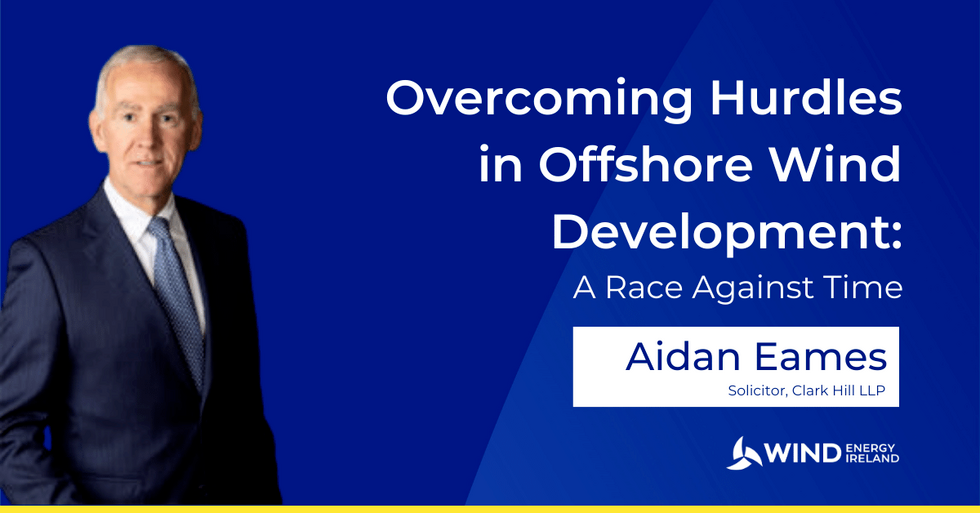Overcoming Hurdles in Offshore Wind Development: A Race Against Time
17 Aug 2023

As the urgency to combat climate change grows, Ireland's ambitious goals to produce offshore renewable energy in the Climate Action Plan 2021 have taken centre stage. Predictions last month from the EPA that Ireland is set to miss 2030 climate targets by a wide margin further emphasises the need to expedite climate action policy. EPA senior manager Stephen Tracy stated the predictions “underlines the urgency of moving to an economy and society powered by renewable energy sources. The longer we wait, the longer it will be before we realise the benefits as the time horizon for achievement of national and EU commitments is getting ever shorter”.
The path to achieving these renewable energy targets is clouded with challenges that threaten to derail progress. From legal appeals and anticipated judicial reviews to delays in planning consent and concerns over capital investment in ports, the obstacles are significant.
A report by international law firm Clark Hill, and which I’m a co-author of, highlights that Ireland's ambitions to reach 5GW of offshore wind production by 2030 and subsequent post 2030 targets are under significant threat. The ‘Offshore Renewable Energy Projects in Ireland Overview Report’ concludes that without immediate intervention, offshore wind farms, each costing nearly €1 billion euro, could miss their delivery dates by four to eight years. Such delays could seriously undermine Ireland's efforts to transition to renewable energy and combat climate change effectively.
A major hurdle in offshore wind development lies in the complexities of the consenting and judicial review system. Our report at Clark Hill highlights the prevalence of legal challenges and judicial review applications, whose outcomes are subject to the newly established Environmental and Planning Division of the High Court. Expectations of straightforward and speedy resolutions are not realistic, and additional complexities arise from referrals to the Supreme Court and the interpretation of EU Directives by the European Court of Justice.
To tackle the challenges posed by the complex regulatory landscape, the Clark Hill report stresses the urgency of appointing a single agency with comprehensive authority. This entity would spearhead efforts to streamline decision-making processes, implement necessary changes, allocate resources effectively, and accelerate offshore wind projects. The importance of coordination among various agencies cannot be overstated, as it will help avoid duplication of efforts and potential conflicts.
A further challenge highlighted in the Report is the dearth of resources and skilled personnel in key state consenting agencies and government departments. Agencies like An Bord Pleanála (ABP) and the newly established Maritime Area Regulatory Agency (MARA) are grappling with under-resourcing and mounting backlogs, creating an unnecessary bottleneck to their ability to fulfill obligations promptly. This dearth of expertise further exacerbates delays and uncertainties in the consenting process.
The success of offshore wind development hinges on the preparedness of enabling infrastructure, particularly ports. As of now, only the Port of Belfast possesses the necessary scale and capacity to handle large turbines. While there is momentum to ready several Tier 1 Irish ports to support turbine assembly and storage, these proposals will require planning consent and may face judicial review at various stages. Delays in developing port infrastructure could compel offshore renewable energy projects to seek alternatives beyond Ireland's borders.
While challenges like judicial reviews may not be entirely avoidable, the Clark Hill report underscores the importance of meticulous planning and presentation of applications from the outset. Well-prepared planning and consenting applications can significantly reduce setbacks and the need to revisit processes when faced with legal challenges.
Ireland's pursuit of renewable energy targets is a critical component of global efforts to combat climate change. Overcoming hurdles in offshore wind development requires immediate action. By empowering a single agency with comprehensive authority, addressing resource constraints, and expediting infrastructure readiness, the government can pave the way for a green energy revolution in Ireland.
Aidan Eames, Solicitor, international law firm, Clark Hill LLP, advises clients on environmental matters and in regulatory, planning, contract structuring and disputes.






